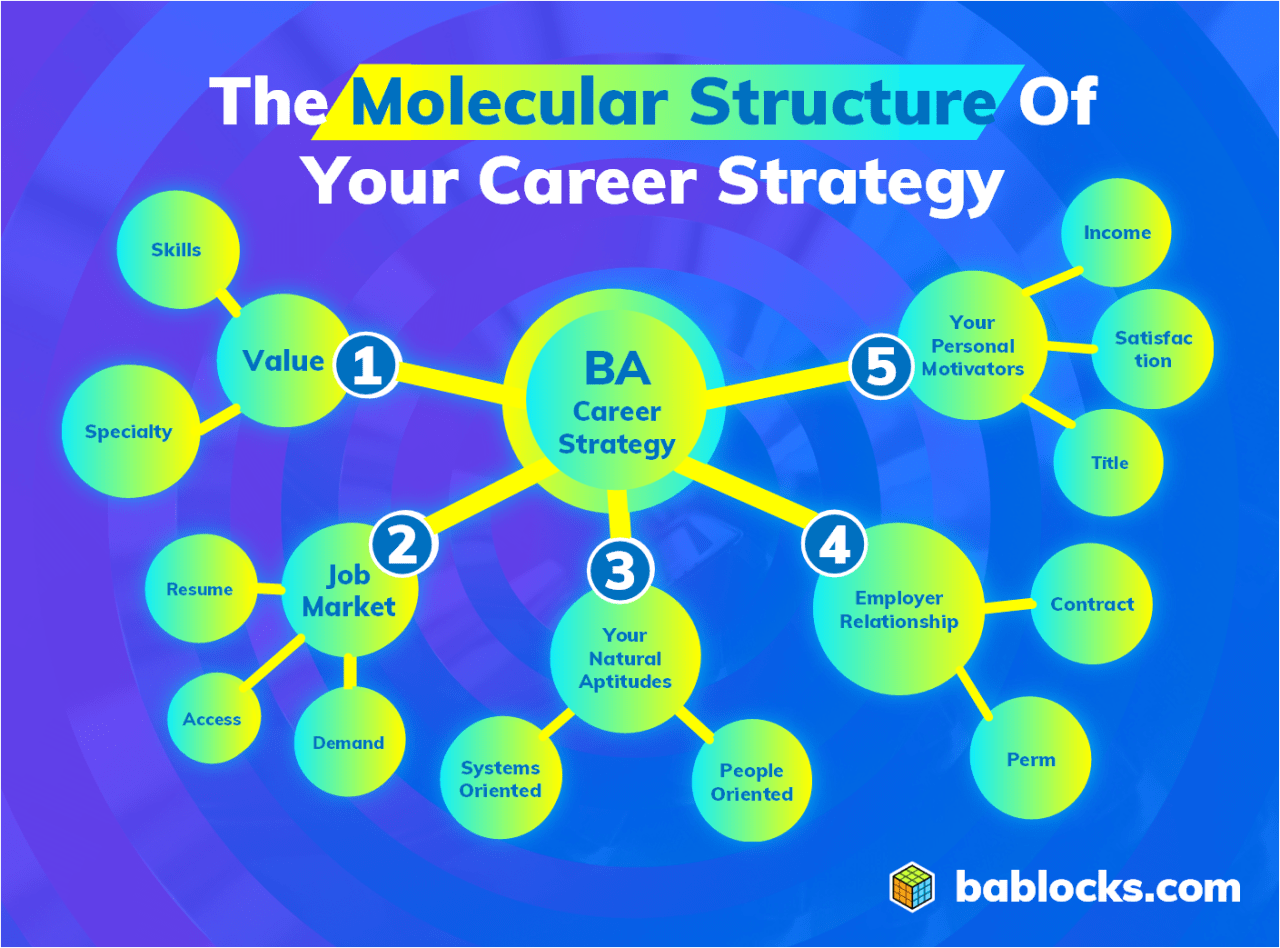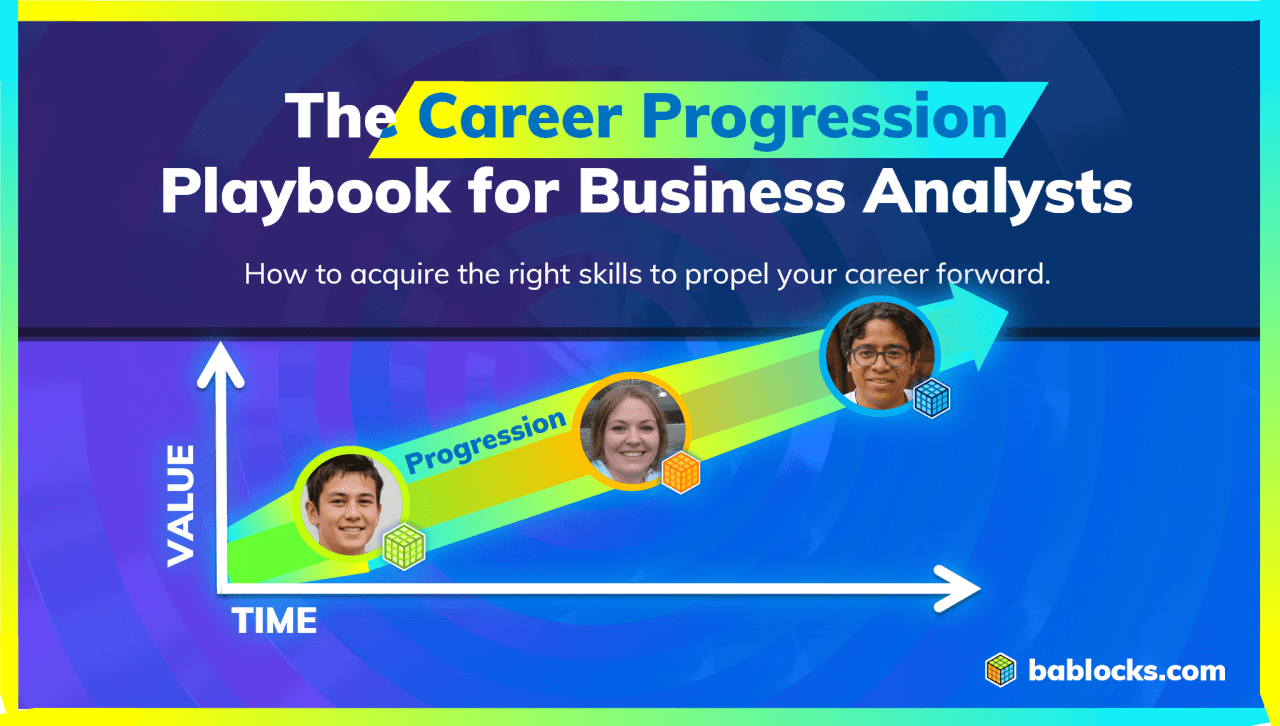Career progression is about value, it’s not about time.
Many business analysts make the mistake of continuing to do the same type of work for long periods of time in the hope that, someday, they achieve the level of progress they want in their careers.
We’ve written this playbook (v1.0) to give you clear guidance on how to build a targeted and actionable career strategy with a value-based view of career progression. A career strategy that is aligned with your personal motivations, fitted to the job markets you can access and geared towards equalizing your income with your value across the three stages of your BA career.

Stage 1: Support
Delivering value by supporting and enhancing existing software products.

Stage 2: Solutioning
Delivering value by delivering net new solutions to help meet business needs.

Stage 3: Strategy
Delivering value by supporting strategic decision making and connecting stratgy to implementation.
A Value-Based View of Career Progression
There are two primary drivers and three secondary drivers that every BA should consider when building a holistic career strategy.
Determining your strategy for high-value output should be the single most important focus for the first few years of your BA career, but out of the 5 career strategy considerations, you must work to arrive at clear answers to at least the first two elements in the shortest time possible.


Value
Skills • Specialties
Building skills and focusing on a specialization to generate the maximum value possible

Job Market
Compensation • Demand • Access
Determining the level of demand in a job market and gaining access to those markets to find a fit.
1 • Value
Your employer measures value by the size of the challenge you’re helping them resolve.
There are some challenges that cost your company a few thousand dollars, and other challenges that cost your company a few million dollars. Learning to solve the thousand-dollar challenge earns you a fraction of a thousand dollars. Learning to solve the million-dollar challenge earns you a fraction of the million dollars.
This commonly overlooked fact lies at the heart of delivering high value. Business analysts can increase the size of the challenge they are solving by upskilling and specialization.
1.1 • Value Through Skills
Your employer measures value by the size of the challenge you’re helping them resolve.
1.1.1 • Skills at Stage 1
At stage 1 of your career, you will likely be assigned to an application support role where you'll be responsible for fixing and extending an existing system. This could be an HR system, a Finance system, a CRM, or one of many other types of applications that your company uses to support its business.
The BA skills you will need at this stage include:
People & Process Skills
1. The ability to manage a small set of stakeholders (usually 3 to 5) and to do Role Analysis
2. The ability to perform a basic level of process mapping.
Product Skills
The ability to describe product details using the following modeling tools:
1. User Stories & Use Cases
2. Wireframes & Screen Specs
3. Entity Models
Project Skills
1. The ability to triage customer requests to manage a product backlog.
2. The ability to operate within an agile environment with regularly scheduled releases.
This stage requires you to build a deep understanding of the inner workings of the software products you are supporting. This functional-level product knowledge becomes critical for moving on to stage 2.
1.1.2 • Skills at Stage 2
At stage 2 of your career, you will likely be assigned to a project with the goal of delivering a net new software product from end to end.
Having understood the inner workings of enterprise systems during stage 1, the BA is very well equipped to understand how to describe the features and functions that the project team will need to build to deliver the new product.
People & Process Skills
1. Richer stakeholder analysis on a larger group of stakeholders.
2. The ability to perform rigorous discovery analysis (current state / as-is)
2. The ability to support your stakeholders with their future state process design exercises.
Product Skills
The ability to describe product details using the following modeling tools:
1. Business Requirements (BRD)
2. Functional Specifications
Project Skills
1. The ability to create and manage a product backlog (playing the role of SCRUM master).
2. The ability to choose the right process based on project type (COTS, Custom, Green Field, Brown Field).
Stage 2 of your career allows you to gain the end-to-end implementation experience you need to be able to start contributing to more senior-level discussions about implementation feasibility and cost/benefit analysis.
1.1.3 • Skills at Stage 3
Many other opportunities open up for you at stage 3 of your career. These opportunities include having direct interaction with executive management to help them understand the implementation feasibility of their business strategies and to help them make better investment decisions for the projects/initiatives they are considering.
People & Process Skills
1. The ability to manage senior/executive-level stakeholders.
2. The ability to guide stakeholders through business architecture & future state process design exercises.
Solution Skills
1. The ability to lead stakeholders through future state system design.
2. Cost & Benefit Analysis
3. Building Business Cases
Project Skills
1. The ability to lead the requirements & design of large multi-component systems (often leading a team of analysts)
2. The ability to operate within an agile, hybrid agile environment with fast-changing priorities.
3. The ability to manage vendors through procurement processes (RFP / RFI).
Being able to conquer stage 3 opens up many other opportunities for you to start exploring to prepare for stage 4 of your career. (see an example of stage 4 here)
1.2 Value Through Specialization
Many of the high-cost challenges that your employer needs to resolve lie deep in the business operations and the systems that are involved. Many of these types of challenges cannot be resolved by generalists alone.
Developing deep expertise in a domain or system gives you the capability to understand, diagnose, and resolve some of the most expensive challenges. You should strongly consider choosing a domain or system to specialize in as you are building up your skills.
Specializing is not only for stage 3. Business analysts can start specializing right away at stage 1.
1.2.1 • Specialize By Domain
Specializing by domain requires you to focus on building expertise and knowledge in a specific industry or functional area
For example, specializing in the healthcare domain would have you build a comprehensive understanding of healthcare systems, patient care processes, medical regulations, and the specific challenges faced by healthcare providers.
A few popular examples of domain specializations include:
By Core Business Function
1. Finance Business Analyst
2. Sales Business Analyst
3. HR Business Analyst
4. Payroll Business Analyst
By Industry Vertical
1. Capital Markets
2. Mining
2. Construction
3. Food Industry
4. Healthcare
5. Logistics
1.2.2 • Specialize By System
Specializing by system requires you to acquire in-depth knowledge of the system's features, capabilities, integration points, and customization options.
For example, specializing in a customer relationship management (CRM) system like Salesforce would give you extensive knowledge of its various modules (sales, marketing, and service), and require you to understand the specific configurations and features available in those modules.
This would enable you to design and implement effective CRM strategies, workflows, and data management practices for your employer.
A few popular examples of product specializations include:
Enterprise Segment Products
1. SAP FICO Functional Analyst
2. Salesforce Business Analyst
3. Workday Business Analyst
4. Murex Business Analyst
SMB (Small-Medium Business) Products
1. Odoo ERP
2. Sage Intact Finance System
3. Hubspot CRM
4. Bamboo HR
1.2.3 • Finding a Niche Specialty
There are many other options for specializing beyond just domain and system. Some business analysts focus specifically on producing business cases while others focus specifically on other areas such as writing high-quality requirements.
These niche specializations may be harder to monetize as a permanent employee, so you will need to consider changing your employer relationship from permanent employee to consultant / freelancer if you choose to pursue a unique niche.
Version 2.0 of the Playbook is in Development.
V 2.0 will also cover the three aspects you need to consider about the job market.
Future releases will address the three remaining career strategy pillars.
The True Value of Business Analysis.
Three short lessons to show you how business analysts link organizational silos to create business/IT alignment.


